PRINCETON, NJ -- Americans are more positive about most major businesses and industries this year, after being more negative nearly across the board in 2008. The banking and automobile industries are two notable exceptions, having seen their positive scores continue to drop this year. The biggest gainers since last year are the grocery industry, the airline industry, and the federal government.
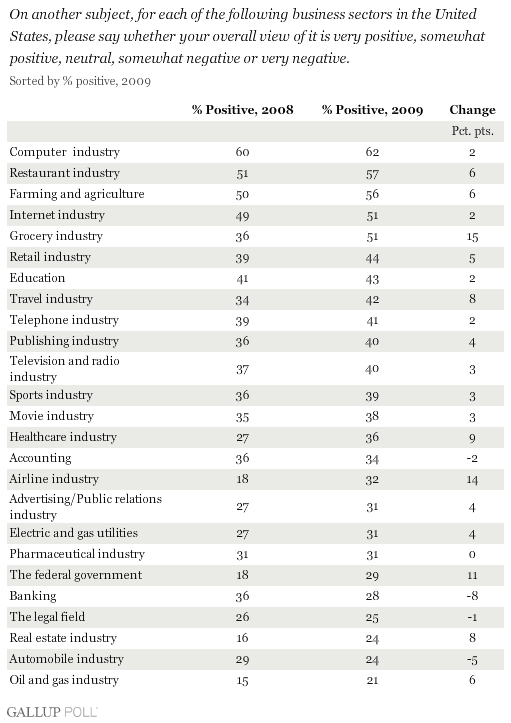
In its annual Work and Education poll, Gallup asks Americans to rate each of 25 major businesses and industries as positive, negative, or neutral. This year's update, conducted Aug. 6-9, finds that many industries that took big image hits in last year's poll have recovered this year. For example, the grocery industry's 15-point gain in positive ratings nearly wipes out the 17-point decline it suffered in 2008, which was perhaps a response to rising food prices. The airline, travel, and oil and gas industries erased their 2008 losses -- likely due to record-high fuel prices in 2008 -- while the real estate, restaurant, and retail industries also rebounded significantly from the steep drops they experienced last year.
But the banking industry lost an additional 8 points this year after a 14-point drop in 2008, and the automobile industry's positive ratings fell an additional 5 points after a 9-point drop in 2008.
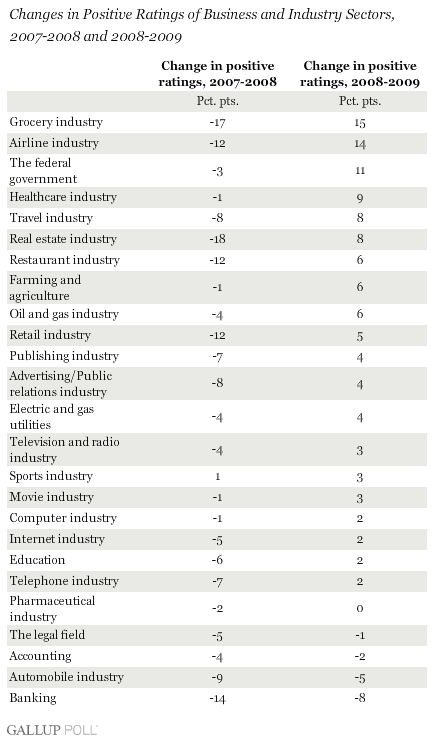
The banking and automotive industries have been struggling financially but also raised the ire of the public when, for example, Wall Street executives continued to receive large bonuses while many of their companies suffered huge losses, and when members of Congress rebuked the Big Three auto executives for taking private jets to Washington to ask for government loans.
Only two years ago, more Americans viewed both industries more positively than negatively. As recently as 2006, a majority of Americans had positive ratings of the banking industry, and in 2003, most Americans viewed the automobile industry in positive terms.
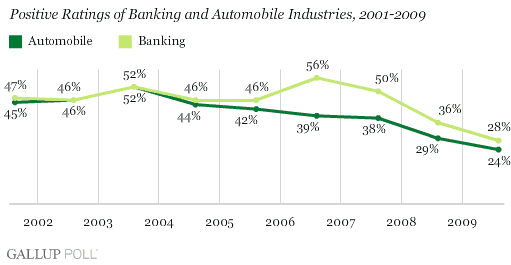
Also notable in this year's data is an increase in ratings of the healthcare industry, which is up 9 points from last year to 36% positive, similar to its 2006 level. That could reflect its taking a much more positive view of healthcare reform this year than it did in 1993-1994, when its opposition helped defeat the Clinton administration's efforts. Still, the public does not hold the healthcare industry in very high regard, with its 36% positive and 48% negative rating.
Computer Industry Gets Highest Marks
On an absolute basis, the most positively rated industries are computers (62%), restaurants (57%), and farming and agriculture (56%). The least positive are oil and gas (21%), automobile (24%), real estate (24%), legal (25%), banking (28%), and -- even after a significant increase likely due to the change in presidential administrations -- the federal government (29%).
The computer industry has been the most positively rated (or tied for the highest from a statistical perspective) in all but one year since Gallup first asked this question in 2001. The exception was in 2006, when the restaurant industry ranked higher.
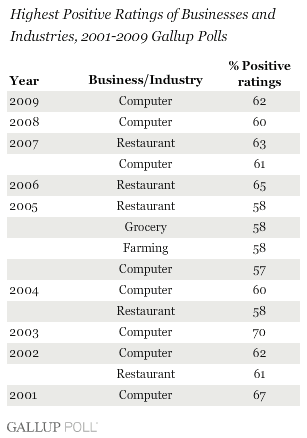
Similarly, the oil and gas industry has had the lowest or tied for the lowest positive ratings in all years except 2002, when the legal field was rated less positively.
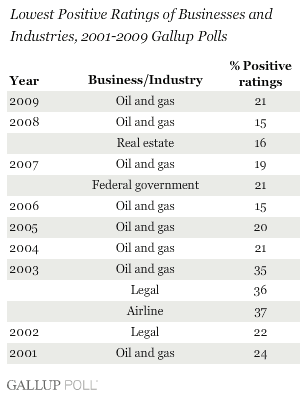
Implications
2008 was a difficult year for U.S. business and industry, and the images of most industries declined as a result. While the full force of the financial crisis was not apparent when Gallup conducted its August 2008 update, gas prices were coming off record highs and Americans were decidedly pessimistic about the direction in which the economy was headed.
Now, in 2009, in part aided by a new presidential administration and some hope of better economic times, most industries' images have improved over last year, with the hard-hit banking and automobile industries standing as notable exceptions.
Survey Methods
Results are based on telephone interviews with 492 national adults, aged 18 and older, conducted Aug. 6-9, 2009. For results based on the total sample of national adults, one can say with 95% confidence that the maximum margin of sampling error is ±5 percentage points.
Interviews are conducted with respondents on land-line telephones (for respondents with a land-line telephone) and cellular phones (for respondents who are cell-phone only).
In addition to sampling error, question wording and practical difficulties in conducting surveys can introduce error or bias into the findings of public opinion polls.
